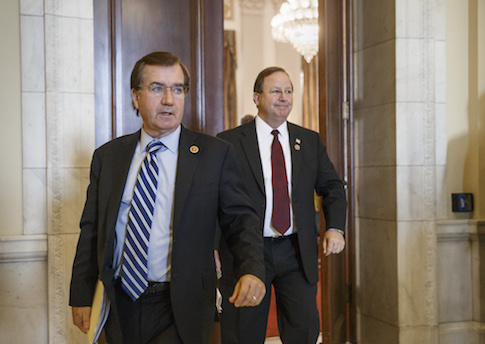The demise of the Republican hawk has been greatly exaggerated, if Tuesday’s House leadership elections are any indicator.
Defense-oriented conservatives won out in races for the chairmanships of key House panels, and in at least one case, a member’s perceived weakness on defense issues may have scuttled his bid to lead an influential bloc of House conservatives.
Tuesday’s leadership elections, which will determine some of the most influential lawmakers of the 114th Congress, could prove another setback for what was once perceived as a rising tide of libertarianism in the GOP and an accompanying aversion to military intervention and defense spending.
That sort of noninterventionist position contributed to the defeat of Rep. Mick Mulvaney’s (R., S.C.) bid to lead the Republican Study Committee, a 173-member bloc of the party’s most conservative members.
RSC elected Rep. Bill Flores (R., Texas) as chairman on Tuesday. He took 84 votes to Mulvaney’s 57 in the second round of voting.
"Pro-defense Republicans, led by Rep. [Trent] Franks [(R., Ariz.)], rallying played strong role in torpedoing Mulvaney," said a House Republican aide with knowledge of RSC’s deliberations. "Republicans are taking back their signature issue, national security," the aide said.
A group of hawkish RSC members circulated a letter to their colleagues in July that spelled out the importance, in their view, of maintaining the group’s commitment to a strong national defense and opposition to federal defense cuts, including those implemented by budget sequestration provisions.
Twenty-five RSC members signed the letter, including retiring House Armed Services Chairman Buck McKeon (R., Calif.), outgoing Intelligence Committee chairman Mike Rogers (R., Mich.), and the heads of RSC’s National Security Working Group, and Military Readiness Task Force.
"We would respectfully request that any candidate for Chairman of the Republican Study Committee be thoroughly vetted to have demonstrated a clear, principled and unequivocal voting record in support of our national security," the members wrote.
"The safety and security of the American people is the first responsibility of the federal government, and the RSC must always be at the forefront of that noble mission," stated the letter.
Another of its signatories, Rep. Mac Thornberry (R., Texas) was elected to succeed McKeon as Armed Services Chairman on Tuesday, handing another victory to RSC’s national defense contingent.
The letter was seen as a thinly veiled shot at Mulvaney’s candidacy for RSC chair, the aide said. The South Carolina Republican has frequently called and voted for deep cuts to the Pentagon’s budget.
That position was a nonstarter with RSC members, the GOP aide said.
"Obama’s foreign policy was a loser in the 2014 elections and it was a loser in Congressional leadership elections. We already have one Susan Rice in the White House, we don’t need another one leading the Republican Study Committee."
Like many of RSC’s libertarian-leaning members, Mulvaney placed a higher premium on deficit reduction than a robust defense budget.
"When we speak candidly about a spending problem and we then seek to puff up the defense budget and it leads people to believe that we aren’t taking the problem seriously," Mulvaney told Politico in 2012 after coauthoring a measure to freeze defense spending with then-Rep. Barney Frank (D., Mass.).
His attempts to slash the Pentagon’s budget earned Mulvaney the ire of some constituents. His district includes the Shaw Air Force Base, which employs more than 5,400 civilian and military personnel.
In contrast to Mulvaney’s positions, Flores is an outspoken opponent of sequestration’s defense budget cuts. His election as RSC chair immediately drew criticism from the group’s libertarian contingent.
"I'm disappointed," Rep. Justin Amash (R., Mich.) told National Journal. "Our membership has gone up because people have been dissatisfied with the RSC over the past few years; and I wish Bill Flores all the best, but I'm not persuaded that the RSC is going to turn into the organization that conservatives expect it to be."
The group Conservative Review emailed supporters noting Flores’ "D" rating on its legislative scorecard. The group, whose founders include a former top official at libertarian-leaning activist group FreedomWorks, blasted Flores for his positions on major national security issues.
The Republican Party’s libertarian wing suffered another defeat on those issues with the election of Rep. Devin Nunes (R., Calif.) as chairman of the House Intelligence Committee.
Nunes has defended National Security Agency surveillance programs that have come under fire from civil libertarians since former NSA contractor Edward Snowden stole and leaked classified documents about those programs last year.
He irked many in the party’s libertarian circles when he referred to Amash as "al Qaeda’s best friend in Congress."
